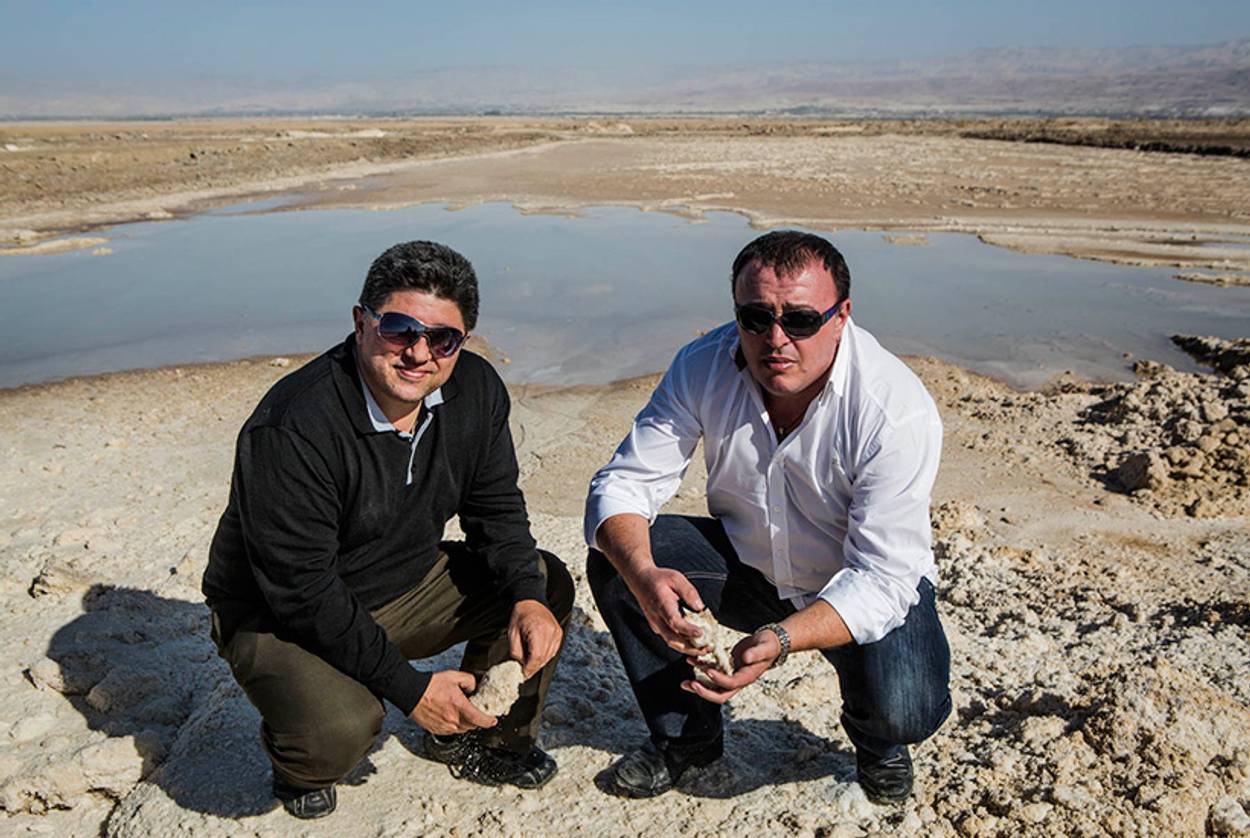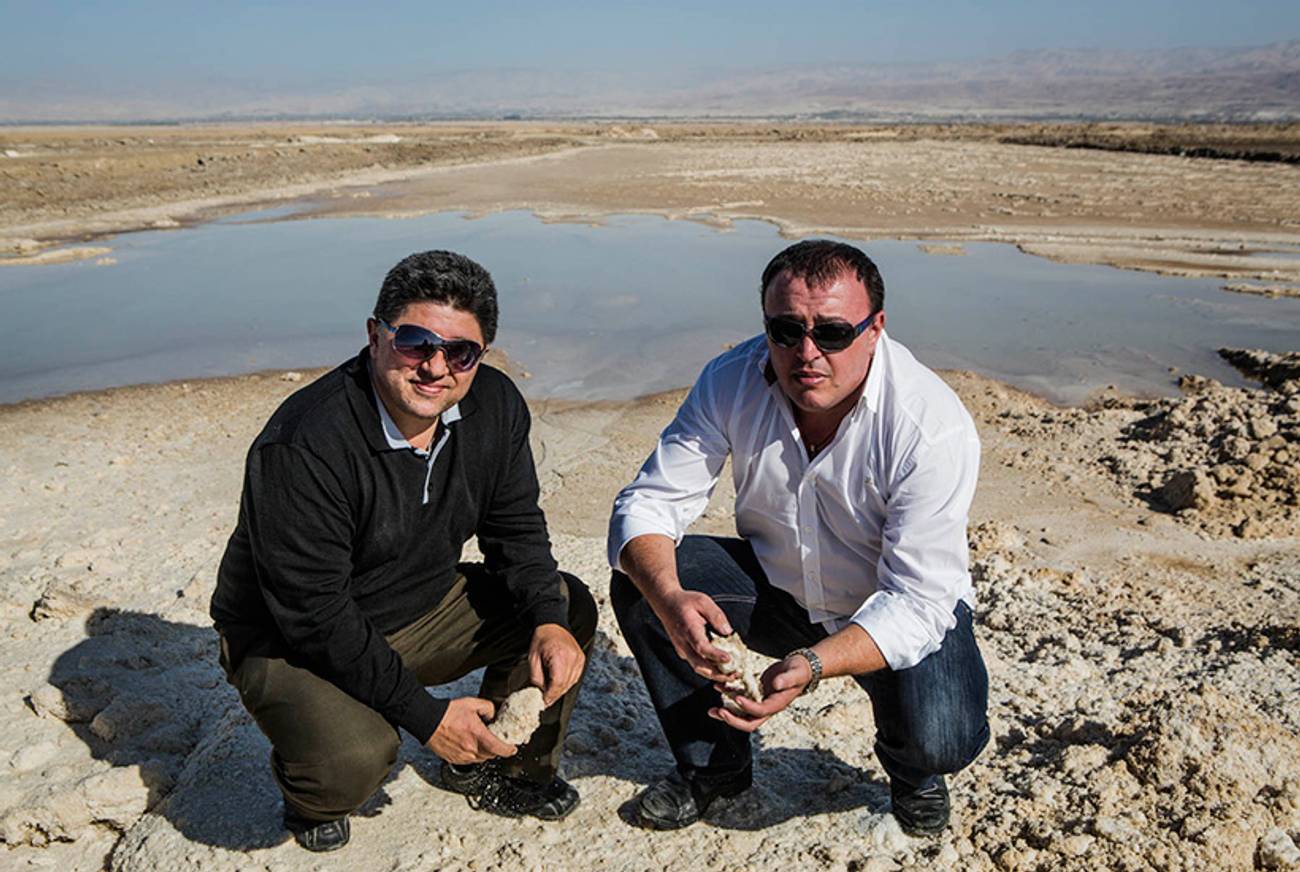Transforming the Dead Sea’s Salt Into a Gourmet Seasoning
An Israeli company works with a Palestinian factory to create salt infused with flavors like rosemary, jalapeño, or red wine




Salt 424, which gets its name from the fact that the surface of the Dead Sea is 424 meters below sea level, is the first company to bring gourmet salt from the Dead Sea to the Israeli and international market. Less than a year after its launch, the company is selling its products in seven countries, including the United States and Canada, and it already has European chefs as acolytes.
The company produces several different lines. The “natural” series includes simple blends: salt with black pepper, salt with hot chili pepper, as well as smoked salt and “wild fire salt” with jalapeños. The “organic” series features pink salt with organic paprika, or salt with organic spinach, dill, or rosemary. A “platinum collection” created in partnership with Dead Sea enthusiast Ari Leon Fruchter is being marketed online under the brand name Naked Sea, receiving its name from a highly controversial art project—hundreds of nude people photographed in the Dead Sea—that Fruchter did with American photographer Spencer Tunick a few years ago. And this month sees the launch of the “health” series of low-sodium and high-fiber probiotic salts.
More unusual is the “exotic” line, which boasts coarse salt with red seaweed, black coarse salt enriched with carbon (which is known to aid digestion), and Merlot wine salt. There’s also golden salt enriched with “edible gold color.” Owner Alon Lior noted that it “doesn’t have any extra nutritional value, but it looks really nice and sparkly on your plate: Putting golden salt on your table when serving the Shabbat meal is just like spreading a nice tablecloth or taking out your good china.”
Chef Frank Azulay uses the black coarse salt to make “black salt fish,” which is wrapped in salt dough and baked, at his restaurant Dagim (“fish” in Hebrew) in Hod Ha-Sharon. “Their salt is great to use in different kinds of dishes,” he said, “and it is also very decorative.”
Salt 424’s “chef” series was developed in collaboration with Israel’s top chefs, such as Azulay, Haim Cohen, and Shaul Ben-Aderet. It offers salt infused with orange and chili, kalamata olives, dried tomatoes and mint, and other interesting flavors. “If in the 1980s, people cooked with lots of seasoning and spices, nowadays gourmet cooking is much more subtle,” said Lior. “Today cooking is returning to basic flavors, and that’s what we based our salt flavors on.”
Lior says Berlin restaurateur and celebrity chef Tim Raue and spice marketer Marcus Lind have taken an interest in his company’s offerings. Moshe Galkop from Zalman’s Meat, one of Israel’s top butcher shops, is also a huge fan: “It’s truly unique in the way it takes your food in unexpected directions with unconventional tastes, and I hold close to 15 different brands of salt in my shop. Flavored salt is great as a finishing salt—it infuses your food with flavors that are difficult, expensive, or impossible to achieve otherwise. For instance, if you sprinkle a bit of Merlot salt on your carpaccio, it tastes like the meat was marinated in wine. Or you can elevate pasta instantly with the kalamata salt or dried tomatoes and mint salt. Another advantage is that if you make a meal for many people, Salt 424 lets the guests put the finishing touches on their plate themselves. Not everybody likes a smoked flavor to their meat or a very spicy dish, and this salt lets the guests decide for themselves.”
It’s all part of a new approach to salt that’s taken hold in Israel recently. “About six or seven years ago something critical changed in the way people perceive salt,” Lior explained. “Salt went through the same kind of change that wine went through in the 1980s and other products like coffee, olive oil, and chocolate went through in recent years or are going through right now.”
***
Lior started his career as insurance assessor, “but my midlife crisis hit me early, when I was in my mid-thirties,” he told me. “Since I love food and cooking, I started looking for things to do in the food industry. I managed the Haifa branch of the Agadir Burger chain. Then I opened a pancake house in Haifa. That’s when I took a day trip with my kids to the Dead Sea and by chance met Hoosam Hallak, the Paletstinian owner of a salt factory in the Dead Sea called West Bank Salt. We talked and he invited me to see how he makes salt. Two weeks later I came to visit him.”
From 1956 to 1967 there was a small Jordanian/British potash factory located on Jordanian land where West Bank Salt stands today. “After the Six Day War, Hoosam’s father Othman Hallak made an agreement with the Jordanian government to continue operating the plant, and it reopened as a salt extraction business,” Lior continued. “The company has been producing traditional commercial table salt for the West Bank and Gaza and Jordan ever since. The Dead Sea has a desert climate of 40 degrees Celsius, almost no precipitation, and clean dry air, which results in high-quality salt that is rich in minerals. It’s an amazing thing. At the end of my visit, Hoosam gave me a bag of salt to take home. I took that salt to food technologist Dr. Eli Sigler, who analyzed it in his lab. Dr. Sigler told me that this is the richest mineral salt he ever saw.”
Hallak was looking for ways to expand his own business: “In 2004, we started marketing our salt to Germany and other European countries. That’s when we understood that we have a product that stands out,” he said. “For the past four years we have been participating in the Fancy Food Show in the U.S., and from that point on we understood that we have an edge. We were looking for someone who can market that for us.”
Soon after that visit three years ago, Lior recalled, “I had a vision. I was always an entrepreneur at heart, so I decided to take this salt and to develop it into gourmet salt. For gourmet salt I needed a larger size of grain than the one West Bank Salt typically manufactures, so we started working together.”
Nowadays there are essentially two kinds of edible salt: commercial salt, which has chemicals and anti-caking agents added to it, and gourmet salt, which is natural with no additives, and is either sea salt or quarried salt. Salt 424 is sea salt: Dead Sea brine is pumped into ponds. Eight months of evaporation leaves rock salt crystals that are then milled. This takes place on the northern side of the Dead Sea, while the southern side is occupied by The Dead Sea Works—a large potash plant that exports chemical extracted from the Dead Sea around the world. “You can’t produce edible salt from the south side of the Dead Sea because its mineral content is too high and the salt is bitter,” Lior added. “The northern basin receives fresh water from the Jordan River, and the salt there isn’t as high in minerals. Our plant is located on the north shore—therefore our salt is richer in minerals than any other salt, but it is still low enough to be edible.”
Development began in 2011, and Salt 424 launched last May. “We work together in full cooperation,” said Lior, who buys salt from Hallak’s factory and turns it into gourmet salt by refining and infusing it in Haifa. “Hoosam Hallak lives in East Jerusalem, the factory workers live in Jericho, I live in Haifa, and we all work together in perfect harmony.”
“Me being a Palestinian and Alon being an Israeli, for me it’s about the human nature of working together with someone that will make you better,” said Hallak. “If I can make my salt better to market this will benefit me and my company and my workers, and if Alon can help me do that, I won’t judge him for his background. … As far as politics are concerned, we believe that there is room from everybody. We’re industrialists. Our contribution is making the lives of the people around us and those that work for us economically viable. Part of the history of this company is perseverance and resilience, despite being in a very tough area.”
***
Like this article? Sign up for our Daily Digest to get Tablet Magazine’s new content in your inbox each morning.
Dana Kessler has written for Maariv, Haaretz, Yediot Aharonot, and other Israeli publications. She is based in Tel Aviv.
Dana Kessler has written for Maariv, Haaretz, Yediot Aharonot, and other Israeli publications. She is based in Tel Aviv.